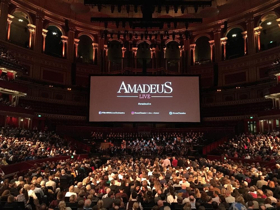Review: AMADEUS LIVE, Royal Albert Hall

![]() If there was ever a film to screen with a live orchestra and choir, it would be Peter Shaffer's multi-award-winning Amadeus. London's Royal Albert Hall continues its successful series of blockbusting films broadcast on an enormous high definition screen, this time accompanied by the Philharmonia Chorus and the Academy of St Martin in the Field.
If there was ever a film to screen with a live orchestra and choir, it would be Peter Shaffer's multi-award-winning Amadeus. London's Royal Albert Hall continues its successful series of blockbusting films broadcast on an enormous high definition screen, this time accompanied by the Philharmonia Chorus and the Academy of St Martin in the Field.
The film follows the elderly composer Antonio Salieri confessing his sins to a priest as he sits in a mental asylum after attempting suicide. He believes that he is responsible for killing Mozart, a rival composer who took the Viennesse court by storm with his genius and revolutionary music. Salieri struggles against his increasingly overwhelming jealousy and ambition and starts to plot against the young and impressionable Mozart. It seems he is the only person who truly recognises Mozart's genius and so is compelled to destroy it.
The story is a work of fiction, with many historical inaccuracies, but it is hard to care when the narrative is so compelling. The wonderful performances still resonate. A sublime F Murray Abraham brings out a tortured and defeated Salieri in what is a masterclass in tortured expression. Tom Hulce's punk version of the puerile Mozart is exceptional; his ability to combine filthy jokes and that famous high-pitched giggle with manic genius remains striking.
The 1984 film looks sumptuous on the huge screen, with the meticulous recreation of the old streets of Vienna and its court; bosoms heave, wigs nearly topple and ornate interiors abound. The eight Academy Awards that the film won seem modest for what can only be described as a cinematic masterpiece.
And the music. Oh, the music! Amadeus is a film that introduces many people to the genius of Mozart and it remains a showcase for some of his best work.
The opening scene accompanied by 'Symphony No.25' is gorgeous and the 'Serenade for Winds', where Salieri delicately describes the introduction of each instrument is breathtaking. The operas also demonstrate stunning playing; the Commendatore scene from Don Giovanni is particularly dramatic and all the elements from The Marriage of Figaro are superbly executed, with a delicate balance of energy and restraint.
It seems completely appropriate to use the orchestra of the Academy of St Martin in the Fields, as this was the very orchestra used in the film itself. Here it is guided with sublime feeling by Swiss conductor Ludwig Wicki, who has vast experience of conducting for films. The sound mixing is so accomplished, it is often easy to forget that the orchestra and choir is live, as it melds so perfectly with the film.
The Philharmonic Chorus is in top form with a well-judged mixture of power and pathos. In particular, the heartbreaking Lacrimosa from the 'Requiem' is both haunting and sublimely beautiful.
For anyone who has seen the film before, this was a wonderful new way to experience it. For those who were seeing it for first time; what a treat it was.
The Royal Albert Hall is presenting many blockbuster films with live music in the coming months
Photo Credit: Aliya Al-Hassan
Reader Reviews
Videos

